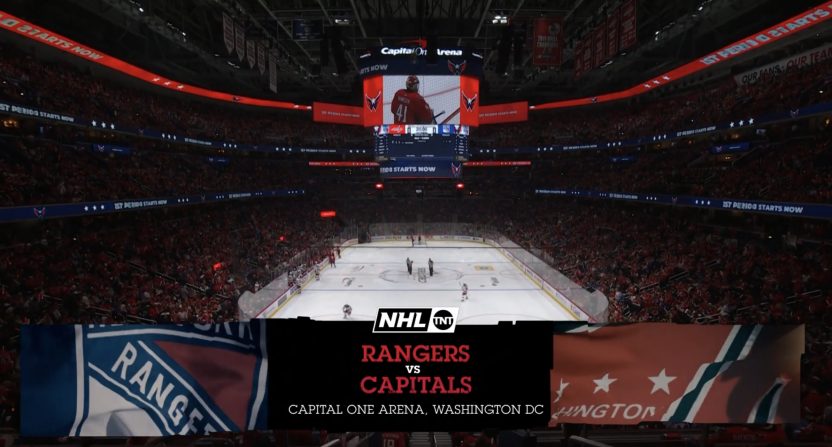Last week, the NHL made its debut on TNT. While fans got nervous during a glitchy performance in the preseason, its regular season debut was much cleaner. Turner Sports brought over some familiar faces from the NHL on NBC in Kenny Albert, Eddie Olcyzk, Keith Jones, Brendan Burke, Liam McHugh and Anson Carter to help in the transition. In addition, TNT took over NBC’s Wednesday night spot to air games.
While ESPN’s re-entry into the NHL laid heavily on nostalgia and some unconventional voices, TNT gave fans some new looks in an attempt to bring fans into a new era. The studio with McHugh, Carter, Rick Tocchet, Paul Bissonnette, and Wayne Gretzky immediately set the pace by bringing in Charles Barkley from the NBA side to welcome the NHL.
That added even more levity to a studio that wanted to bring more fun to the NHL. There was a bit featuring Bissonnette calling some of his old friends to hype the NHL’s new partner.
The NHL on TNT also gave us that moment where the Great One shot pucks at Barkley. You would not have seen that on ESPN, nor NBC.
For the game presentation, TNT aired the New York Rangers versus Washington Capitals, called by Albert, Olczyk, and Jones. In comparison to ESPN, which gave us a minimalist scorebug, TNT provided more information on its graphic like a real-time shots on goal stat, plus real-time statistics on the bottom.
TNT differed from ESPN, which gave non-traditional voices like Sean McDonough and John Buccigross, plus Leah Hextall on ESPN+ later in the week. With Albert and Burke on the case, TNT was telling fans that it would provide experienced voices to call their games.
In addition, during TNT’s nightcap between Chicago and Colorado, Burke was teamed with former ESPN’er Darren Pang, who has been calling games for the St. Louis Blues. The on-ice analyst was 15-year NHL veteran Jamal Mayers, who gave some very good perspective. Having worked for NBC Sports Chicago and NHL Network, Mayers was smooth and offered some analysis that was different from Pierre McGuire, who would often provide silly lines rather than offer real analysis.
TNT offered some innovation to its broadcast by showing a power play clock not only on the bottom of its scorebug, but in between the faceoff circles on the ice. It was clean and did not intrude on the action. It was similar to the NBA on TNT’s shot clock which is shown on-court.
The power play clock on the bug matched the team color on the power play. That was also a nice touch for the broadcast. TNT did not try to oversell its presentation and gave some different looks without being too gimmicky.
Overall, TNT was telling fans that it would take care of the sport that had been with NBC for 17 years. It has some time to convince the hardcore fans that the game is in good hands. So far, so good.
